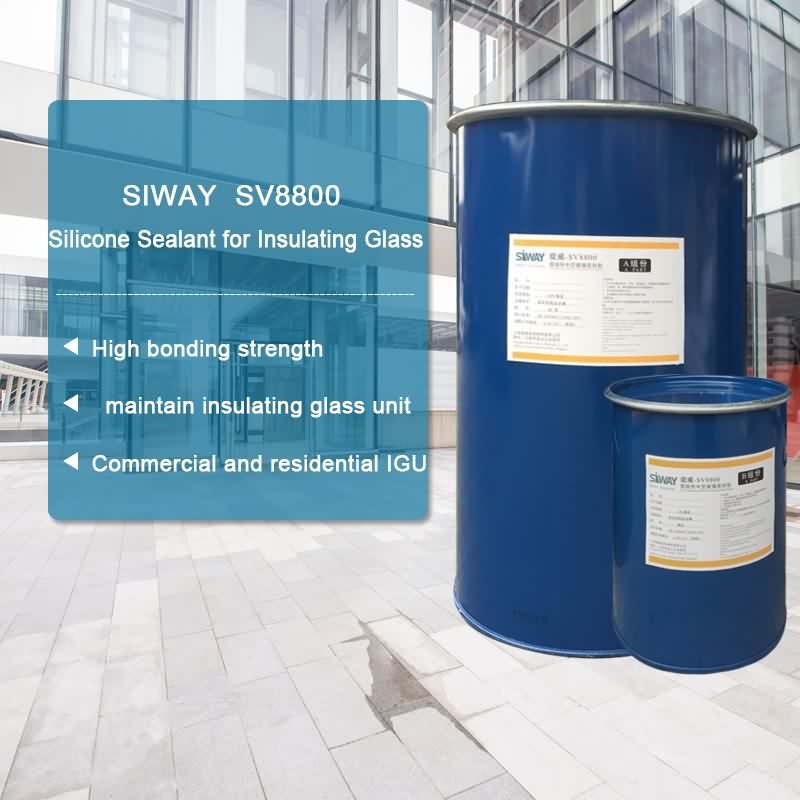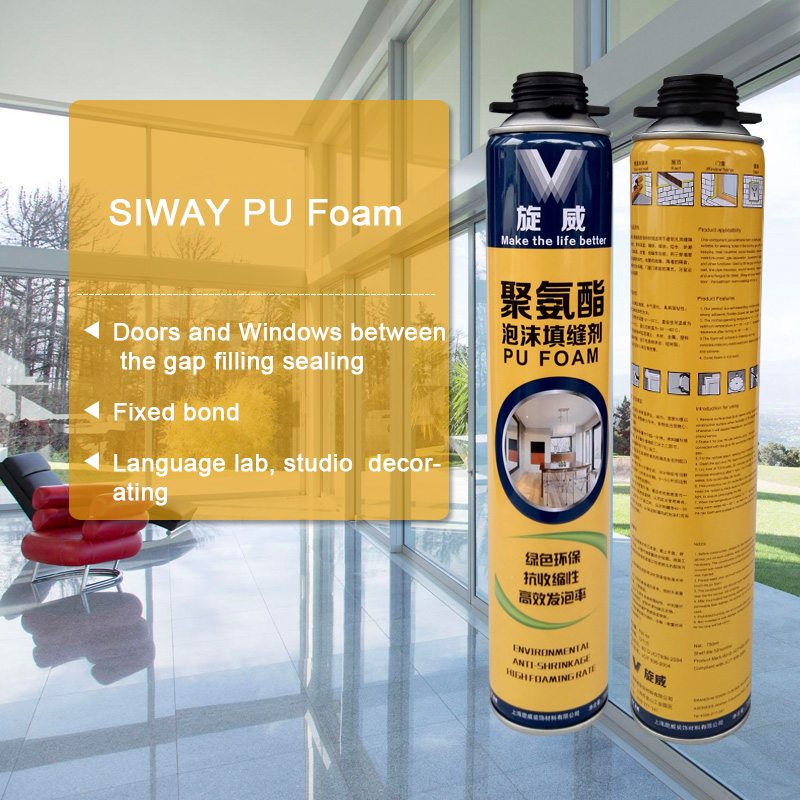New Arrival China SV-8800 Silicone Sealant for Insulating Glass Supply to Singapore
Short Description:
Description SV-8800 is two components, high modulus; neutral curing silicone sealant specifically developed for assembly of high performance insulated glass units as secondary sealing material. Where to use It is a two-component silicone that offers variable work life with high bonding strength to maintain the integrity of insulating glass unit, suits both commercial and residential IGU. Key Features 1. High Modulus 2. UV resistance 3. Low vapor and gas transmission 4. Primerless adhesion...
The customer satisfaction is our primary target. We uphold a consistent level of professionalism, quality, credibility and service for
New Arrival China SV-8800 Silicone Sealant for Insulating Glass Supply to Singapore, We warmly welcome merchants from home and abroad to call us and establish business relationship with us, and we will do our best to serve you.
Description
SV-8800 is two components, high modulus; neutral curing silicone sealant specifically developed for assembly of high performance insulated glass units as secondary sealing material.
Where to use
It is a two-component silicone that offers variable work life with high bonding strength to maintain the integrity of insulating glass unit, suits both commercial and residential IGU.
Key Features
1. High Modulus
2. UV resistance
3. Low vapor and gas transmission
4. Primerless adhesion to coated glass
5. 100% compatible to SV-8890
Technical data sheet
| Test standard | Test project | Unit | value |
| Before curing——25℃,50%R.H. | |||
| GB13477 | Specific gravity(After mixing) | 1.33 | |
| GB13477 | Operating time | min | 20-40 |
| GB13477 | surface drying time(25℃,50%R.H.) | min | 80-188 |
| corrosivity | No | ||
| 7 days after curing——25℃,50%R.H. | |||
| GB/T 531 | Durometer Hardness | Shore A | 40 |
| GB13477 | The tensile modulus at 12.5% elongation | Mpa | 0.18 |
| The ultimate tensile strength | Mpa | 0.92 | |
| GB13477 | Elongation limit (fracture) | % | 150 |
Certification
GB-24266-2009;
Color
Component A(Base) – White, Component B(Catalyst)- Black
Package
1. Component A(Base): (190L), Component B(Catalyst) (18.5L)
2. Component A(Base):24.5kg (18L), Component B(Catalyst): 1.9kg (1.8L)
Shelf life
12 months
Note
If you want the TDS or MSDS or other details, please contact with our sales person.
Let’s have fun with Everyday video on ElieOops Channel !
ElieOops Channel ► https://bit.ly/Elieoops (upload everyday)
Slime TV → bit.ly/Slime_TV
Mini Elsa → bit.ly/MINI_ELSA
Elie adventure → bit.ly/Elie_Adv
Please Subscribe!! ►
Elie Oops Channel → https://www.youtube.com/elieoops
FOLLOW ME ►
Facebook : https://www.facebook.com/elieoops/
Instagram : https://www.instagram.com/elieoops/
Twitter : https://twitter.com/Elieoops/media
Created By
Supakorn (Jack) & Pin-Chen (Elie)
Hello everyone I’m Elie , and welcome to Elie Oops Channel !!!
In this channel you will see a lot of funny stuffs such as making slime , silly putty, oobleck, Play Doh , Clay animation, Elsa toy animation ,stop motion , Kids arts and also cool magic tricks. You can follow my tutorial to try to make your own master pieces!
I really love to make slime and play with Play Doh. There are plenty of slime and playdoh tutorial in my channel. Please, feel free to share your opinions and suggestions on my videos, my slime , silly putty and PlayDoh. I will keep improving my channel, and sure !! I will bring your Ideas and make it on my videos! I really hope that everyone will enjoy my videos.
===================================================
Please subscribe my channel to see more coming soon episodes of Frozen Mini Elsa, Making slime and Play doh animation. Likes and comments will help me a lot to improve the production. If you have any suggestion please tell me.
アナと 雪の女王 – ミニエルザのより近日公開のエピソードを見るために私のチャンネルを購読してください。いいね!やコメントが私の生産性を改善するためにたくさんのに役立ちます。あなたはどんな提案がありましたら教えてください。
Watch more funny videos, please visit my channel
https://www.youtube.com/elieoops
Check out our blog for more details about this DIY!
(https://www.heywandererblog.com/2017/06/diy-stock-tank-pool-everything-you-need.html)
Instagram- https://www.instagram.com/heywanderer
E-mail- heywanderer@gmail.com
Things you will need:
- Stock tank
- Above Ground Pool Pump (https://www.amazon.com/gp/product/B005QIYMNM/ref=as_li_tl?ie=UTF8&camp=1789&creative=9325&creativeASIN=B005QIYMNM&linkCode=as2&tag=heywanderer-20&linkId=eb02a0f70f7346365cb3605526c762a1)
- Weatherproof Silicone Sealant (https://www.amazon.com/gp/product/B0000CBJ7W/ref=as_li_tl?ie=UTF8&camp=1789&creative=9325&creativeASIN=B0000CBJ7W&linkCode=as2&tag=heywanderer-20&linkId=fed3bf25655f953f9dffe6f5a7125b41)
- Hole Saw with Arbor (https://www.amazon.com/gp/product/B00N41ECXI/ref=as_li_tl?ie=UTF8&camp=1789&creative=9325&creativeASIN=B00N41ECXI&linkCode=as2&tag=heywanderer-20&linkId=53e5f5258cb8b72c0e3d0de148b30929)
- Plunger Valves (https://www.amazon.com/gp/product/B00EIMRZGS/ref=as_li_tl?ie=UTF8&camp=1789&creative=9325&creativeASIN=B00EIMRZGS&linkCode=as2&tag=heywanderer-20&linkId=892e868c1267ff7ffd6407c597d557eb)”
- Pool Outlet (https://www.amazon.com/gp/product/B004S7QQ2M/ref=as_li_tl?ie=UTF8&camp=1789&creative=9325&creativeASIN=B004S7QQ2M&linkCode=as2&tag=heywanderer-20&linkId=108da486037248ed5399ade919e504e9)
- 1-3 Rubber Washers (or Gaskets) (https://www.intexcorp.com/10255.html)
- Strainer Nut (https://www.intexcorp.com/10256.html)
Other things you will need for maintenance:
- Chlorine Tablets (https://www.amazon.com/gp/product/B00PZZFQKY/ref=as_li_tl?ie=UTF8&camp=1789&creative=9325&creativeASIN=B00PZZFQKY&linkCode=as2&tag=heywanderer-20&linkId=dd445281975e0f88f1840b8924aabc5c
- Floating Pool Dispensert (https://www.amazon.com/gp/product/B000P5A4R4/ref=as_li_tl?ie=UTF8&camp=1789&creative=9325&creativeASIN=B000P5A4R4&linkCode=as2&tag=heywanderer-20&linkId=8aa8479f61243a92ea124f1d9423f376
- Water Testing Kit (https://www.amazon.com/gp/product/B0038YL4M8/ref=as_li_tl?ie=UTF8&camp=1789&creative=9325&creativeASIN=B0038YL4M8&linkCode=as2&tag=heywanderer-20&linkId=b233a993b3d0993b7de815a339d3e7da
Step 1- Find a nice level area to lay the stock tank on. If the area where you have chosen isn’t level, use sand or rocks to build up whatever side needs it. It is very important that your stock tank be level so there aren’t any unexpected leaks.
Step 2- Cut holes in your stock tank. I’m not going to lie- this is a pain in the butt. We bought a hole saw with an arbor and it took two people to get through the metal. You will need two holes, one at the top and one at the bottom. In an above ground pool, these aren’t usually right on top of each other, but ours are. We haven’t ever seen this as a problem.
Step 3- Start assembling the parts. In the pool pump package there is a packet with instructions, warnings and troubleshooting. This packet proved to be vital in the setup of the pool. I did end up getting 2 gaskets for the bottom section (the drain section), one for the inside of the pool and one for the outside. It only says you need one for the inside, but this was causing a drip for us. I also put thread seal tape around the connections that were closest to the pool. There are a lot of connections, and each one has a gasket, so you could probably get away without the tape. I didn’t put it on all the connections, the only ones that really seemed to matter were the ones that are connecting the hoses to the pool.
Step 4- Apply silicone waterproof sealant around all crevices involving the input and output parts. I did this on the inside of the pool and the outside. And I applied it VERY HEAVILY and did two layers, allowing one to dry before the second was applied. Sealing these crevices is one of the most important parts. This is what is going to keep the water in the pool. Well all of these steps are leading up to keeping water in the pool, but if there is any chance that it’s going to be getting out, this is what will save you.
Step 5- Test for leaks. Before I added water to the pool, I took a water bottle and poured a good amount of water on the input and output parts. You could also just use a water hose. I would make sure the hose wasn’t on full blast. You don’t want to accidentally penetrate the sealant.
Step 6- Once you are sure there aren’t any leaks, fill the pool just above the bottom hole/output. Check again to see if any leaks have started. If there aren’t any, fill the rest of the pool up!
Step 7- Turn the pump on. Make sure both plunger valves are open/unlocked. When you first do this water may not come out of the output, but there is a solution! Twist off the knob on top of the filter pump to let some air out. Some water may escape too and that’s okay, just be ready to screw it back on as soon as the water starts coming out.


